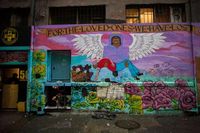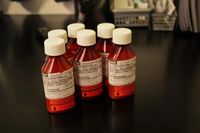As I lay in bed in my shared hospital room following surgery to remove another part of my intestine, you heard me correctly, another part of my intestine, I writhe in agony. Fear of how I would be viewed as a person and cared for as a patient, I put myself in unnecessary and excruciating pain. For years, I used heroin and was constantly conflicted regarding how to approach this issue when engaging with healthcare providers. As a result, the nurses who cared for me scrambled to figure out why their protocols for post-op pain management weren’t doing the trick for me.
Let me provide some context into what was happening to me in the hospital. In 2002 I was struggling to walk. I was constantly hunched over in pain, needing to rest after every few steps. It was becoming clear something was wrong. While I was relatively new to heroin at the time, I had been smoking it long enough to experience withdrawals on days I didn’t use. I had no clue how to address my drug use when interacting with healthcare professionals. Despite my apprehension, after a few weeks I couldn’t take it anymore. With a referral from my family doctor, I saw a Rheumatologist. After a brief examination he advised a Computerised Tomography (CT) scan to find the source of my symptoms. Following the scan I was told to see a second doctor at another hospital who determined that an abscess had ruptured in my lower back and surgery would be required to remove the fluid. That one appointment turned into twenty-two days in hospital during which eight inches of my lower intestine were removed; where was heroin when I needed it most?
Waking up with forty staples running down my abdomen felt like what I imagine liquid hot magma being poured over your stomach would feel. Following the surgery, every movement including breathing, swallowing, hiccups or a simple yawn was excruciating. Can I have some drugs please? The image of Frankenstein being put together piece by piece became seared in my brain.
At the time of the surgery I was lonely, my mom had passed. While my father did visit eventually, he only came once. A few days after surgery when I woke up it was my friend Ricky, who I have known since grade five, at my bedside. I was glad to see her there but also scared as I feared that I may have woken up with a colostomy bag attached. Luckily I didn’t and with relief I passed out again. I was later told that I had Crohn’s disease.
Before my diagnosis, I lived a regular life, free of major health complications. Living with Crohn’s can be a nightmare. Crohn’s is an autoimmune disorder and inflammatory bowel disease that causes chronic inflammation of the gastrointestinal tract. Symptoms include “fatigue, weight loss, extreme abdominal pain, diarrhea, nausea, vomiting, and bowel obstructions that oftentimes lead to surgeries” of which I had many. To this day the cause of Crohn’s disease remains unknown. It is thought that diet and stress are factors which may aggravate Crohn’s and heredity and a malfunctioning immune system may play a role in its development.
“I was later told that I had Crohn’s disease.”
Hospital staff could not understand why standard post-op pain management medications did not ease my pain. I had been given Percocet, Percodan, and Demerol. The hospital staff were ‘freaking out’ because nothing was working. The funny thing is that when I finally revealed that I was a regular drug user, I still refused to allow myself to say the word heroin, instead I tried to downplay the severity of my usage by saying I was using Oxycontin. I felt like by saying I was using Oxycontin instead of heroin, I wouldn’t be stigmatized as severely and I would have a better chance of garnering their sympathy and getting help. There is likely some truth to this. After I told them, they administered a morphine drip which finally gave me relief.
Juggling the challenges as a person who uses drugs with Crohn’s has been tough. My life became difficult, from my diet to what I was physically able to do, to how I felt, thought and interacted with my increasingly complex day to day existence. First, the drug withdrawals faced by any long-term opiate user. Second, the ongoing hours-long ordeal of time spent in the bathroom enduring cramps, gut-wrenching pain and praying to any god to listen. Nevertheless I would gather whatever energy I had and score my dope.
For a time I wasn’t working and my days were spent running to and from the bathroom or lying doubled over on the couch in discomfort as heroin provided me with some measure of relief. I would eat something small and simple that I could keep down, fall asleep, and repeat, again and again. The worst was when I had a Crohn’s flare up, which is bad enough on it’s own, while at the same time experiencing drug withdrawals.
“My life became difficult, from my diet to what I was physically able to do, to how I felt, thought and interacted with my increasingly complex day to day existence.”
Methadone treatment was also part of the mix as my funds were limited. My introduction to methadone was fairly quick; a urine test, a brief chat and they started me at 30 milligrams. Come back in a week, let’s see how you are doing? The doctors threw in some clonidine for sweating and seroquel for sleeping. They told me I would need up to 80 milligrams for the methadone to have an impact on my receptors in order for the desire for opiates to wane. I asked: “What do I do until I get to 80 milligrams?” They coldly replied “grin and bear it”; nice, right? On more than a few occasions I would still need to use. Their lack of empathy was disheartening. It became apparent to me that my doctor was more interested in keeping me on the program even if it wasn’t helping me.
When did making money become more important for doctors than the health and wellbeing of patients? Researchers hypothesise that minimising barriers to the provision of methadone maintenance therapy would likely contribute higher rates of retention for methadone patients. This was certainly my experience.
The archaic methods of torture designed by ‘modern’ methadone doctors who don’t seem to know much about the nature of drug use is heavily problematic. It left me stuck in a system where my doctor was happy to prescribe medication, get paid and keep me feeling like a slave to the ‘drug they were selling’. As I have personally experienced – with the prevalence of fentanyl which is often cut with other drugs including benzodiazepines – as drugs change and get more potent, treatment options have done a poor job of adapting to the evolving needs of people who use drugs.
“The archaic methods of torture designed by ‘modern’ methadone doctors who don’t seem to know much about the nature of drug use is heavily problematic.”
I have met people who use drugs from all walks of life. We have our own distinct goals and interests as well as trials and tribulations. Some of these are shared, while others are unique to individuals. Outdated drug laws, police interference and prohibition in general complicate this implicitly. Programs and initiatives like safe supply, compassion clubs and a push towards decriminalization can change the negative outcomes experienced by myself and so many others. Unfortunately we have to “constantly battle against massive state, institutional, and private sector apparatuses to get access to the means for our survival”.
I recently read an article about a young woman named Annalise Mabe who lives in the United States. Much like myself, she was in a “gastroenterologist’s office three weeks after a recent major surgery that involved removing 12 inches of my inflamed small intestine due to Crohn’s disease.” We even both take the same medication called Remicade which is extremely expensive for her. I get covered by a special compassionate care program which also covers my infusions. Life is complicated for everyone living with Crohn’s and we all have our own struggles. Being a person who uses drugs with Crohn’s is complicated, but much like Annalise I try to stay positive.
“Programs and initiatives like safe supply, compassion clubs and a push towards decriminalization can change the negative outcomes experienced by myself and so many others.”
We all want to be happy and healthy and have no desire to be a ‘drain on society’. However, a normal life is far from easy when seemingly insurmountable roadblocks which include illness, stigmatization, and criminalization (to name a few…) exist. Drug prohibition seems like something we should have moved past a long time ago and as my story shows, contemporary drug laws have done nothing to help people like me or society. The complex web of social, structural and personal barriers encountered by human beings simply trying to live a normal life are amplified by drug criminalization, where a concept of normal drug use does not yet exist.




